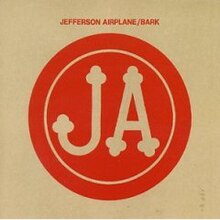Bark (album)
| Bark | ||||
|---|---|---|---|---|
 |
||||
| Studio album by Jefferson Airplane | ||||
| Released | September 1971 | |||
| Recorded | December 1970 – July 1971 at Wally Heider Studios, San Francisco | |||
| Genre | Psychedelic rock, hard rock | |||
| Length | 44:17 | |||
| Label | Grunt | |||
| Producer | Jefferson Airplane | |||
| Jefferson Airplane chronology | ||||
|
||||
| Alternative cover | ||||

Cardboard sleeve that came with the original vinyl LP release (RCA Victor, 1971)
|
||||
| Professional ratings | |
|---|---|
| Review scores | |
| Source | Rating |
| Allmusic | |
| Rolling Stone | favorable |
Bark is the sixth studio album by Jefferson Airplane. Released in 1971 as Grunt FTR-1001, the album is one of the Airplane's late-period works, notable for the group's first personnel changes since 1966. The album was the first without band founder Marty Balin (who departed the band during the recording process but without featuring in the sessions) and the first with violinist Papa John Creach. Drummer Spencer Dryden had been replaced by Joey Covington in early 1970 after a lengthy transitional period in which both musicians had performed with the band.
Bark was the Airplane's first all-new release in two years, the previous being 1969's Volunteers. It was also the first album to be released under the Jefferson Airplane-owned Grunt Records label.
Lead guitarist Jorma Kaukonen received four songwriting credits on the album, indicative of his growing importance as a composer. At the time, he and bassist Jack Casady had already recorded two albums for their spin-off blues group Hot Tuna.
The album reached #11 on the Billboard album chart (outperforming both Volunteers and Kantner's Hugo Award-nominated 1970 solo album Blows Against the Empire) and was certified gold by RIAA. An accompanying single, the Covington-led "Pretty as You Feel"—excerpted from a longer jam on the LP with members of Santana—was the band's final Top 100 American hit, peaking at #60.
Recording for the album began in 1970 following the commercial failure of Grace Slick's "Mexico", a single that railed against the Nixon administration's anti-marijuana Operation Intercept initiative. Planned tracks included live versions of "Mexico" and its B-side (the Kantner-penned "Have You Seen the Saucers?"), Balin's "You Wear Your Dresses Too Short" and "Emergency", Peter Kaukonen's "Up or Down" (sung by Balin), and Covington's "Whatever The Old Man Does (Is Always Right)" and "The Man (The Bludgeon of the Bluecoat)", a 1950s rhythm and blues pastiche inspired by the contemporaneous murder of Rubén Salazar by a Los Angeles County Sheriff's Department deputy. A tour of the United States continued through the autumn of 1970 with violinist Papa John Creach joining the band on the day of Janis Joplin's death. Balin did not perform at the band's concert at Winterland Ballroom on October 5 in remembrance of Joplin but continued with the tour; nevertheless, he was growing increasingly frustrated with the band's drug use and "playing that messed up cocained music."
...
Wikipedia
